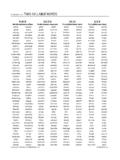Transcription of The Thinking Horse: Cognition and Perception Reviewed
1 IN-DEPTH: BEHAVIOR. The Thinking Horse: Cognition and Perception Reviewed Evelyn B. Hanggi, MS, PhD. Cognition and Perception in horses has often been misunderstood. Not only in the past but even today, people proclaim that horses react only by instinct, that they are just conditioned-response animals, that they lack advanced cognitive ability, and that they have poor visual capabilities ( , acuity, color vision, depth Perception ). Until relatively recently, there was little scientific evidence to address such beliefs. Change, however, is underway as scientific and public interest in all aspects of equine learning and Perception intensifies.
2 A review of the scientific literature, as well as practical experience, shows that horses excel at simpler forms of learning such as classical and operant conditioning, which is not surprising considering their trainability when these principles and prac- tices are applied. Furthermore, horses have shown ease in stimulus generalization and discrimina- tion learning. Most recently and unexpected by many, horses have solved advanced cognitive challenges involving categorization learning and some degree of concept formation. A comprehen- sive understanding of the cognitive and perceptual abilities of horses is necessary to ensure that this species receives proper training, handling, management, and care.
3 Author's address: Equine Re- search Foundation, PO Box 1900, Aptos, CA 95001; e-mail: website: www. 2005 AAEP. 1. Introduction wild, they must cope with food and water of inconsis- Traditionally, horses (Equus caballus) have rarely tent quality or unpredictable distribution, predators been classified as intelligent, and even today, gaps in that change locations and habits, and a social system knowledge, myths and misconceptions, and limited re- in which identities and roles of individuals must be discovered and Domesticated horses search affect how horses are understood or misunder- may face even more potentially bewildering condi- stood by the public, the horse industry, and even the tions.
4 In addition to dealing with similar situa- scientific community. Common beliefs maintain that tions encountered in nature, many domesticated horses have a brain the size of a walnut; horses do not horses must live in largely unsuitable environ- think; horses are merely conditioned-response ani- ments, must suppress instincts while learning tasks mals; horses cannot generalize; horses have no sense that are not natural behaviors, and must co-exist of concept; horses are colorblind, have poor acuity and with humans who sometimes behave bizarrely, at depth Perception , and cannot transfer information least likely from an equine standpoint.
5 horses , from one eye to another. both feral and domesticated, are faced with varied In reality, horses manage not only ordinary daily conditions that require an assortment of learning cognitive tasks but mental challenges as well. In the and perceptual capabilities. NOTES. 246 2005 ! Vol. 51 ! AAEP PROCEEDINGS. IN-DEPTH: BEHAVIOR. Research is gradually providing insight into the complex and fascinating nature of Cognition and per- ception in horses . This presentation will review learning theory and key scientific studies to date on these abilities.
6 The findings are not only interest- ing and useful for the education of clients but also relevant to efficient veterinary interaction with horses . Moreover, this information may be drawn upon to enhance the training and behavior modifi- cation of horses . 2. Habituation and Desensitization Habituation is a learning process whereby, after repeated exposure at the same intensity to an incon- sequential stimulus, an animal becomes accustomed and its reaction to that stimulus either diminishes or disappears. A stimulus may be anything that Fig.
7 1. This horse is being positively exposed, without restraint, to incites a response. Although this is an extremely a variety of visual, auditory, olfactory, and tactile stimuli. Stimuli simple form of learning, it is, nonetheless, extremely include a bouncing beach ball, multicolored shiny mylar balloons, important because it allows an animal to subcon- a bobbling umbrella, a plastic tarp, pylons, a barrel filled with sciously filter out nonvital information in its envi- rocks dragged rapidly around the horse, and strangely behaving humans.
8 Photo credit: Evelyn B. Hanggi. ronment and focus instead on what is significant. From birth to old age, horses learn through habitu- ation. In a new environment, many horses tend to be much more reactive, at first paying attention to any and all stimuli perceived by any of the senses. 3. Classical and Operant Conditioning and However, when particular stimuli turn out to be Reinforcement insignificant, the response diminishes. horses , like most organisms, learn effortlessly Desensitization is a process used to extinguish a through classical or Pavlovian conditioning, which response to a stimulus in a sensitized or hypersen- occurs when initially unimportant stimuli or events sitized animal.
9 For instance, a horse may become are regularly paired with stimuli that initiate some unusually fearful or sensitive to being bridled be- type of response. As a result, a new stimulus re- cause of rough handling of its ears or the bit banging sponse association forms in which an animal gives a against its teeth. This leads to head shyness and response upon presentation of the original inconse- the need for retraining. Such training will be more quential stimulus (now the conditioned stimulus), problematic because the horse will attempt to avoid even though the unconditioned stimulus is no longer the bridle; therefore, the handler will need to ap- available.
10 Under this condition, the animal's be- proach the horse's head in increments and retreat havior does not affect the occurrence of later events. when necessary until the horse willingly accepts Horse trainers use classical conditioning regularly normal, gentle bridling. This is an example of de- when they place a word onto a behavior, such as sensitizing a horse that had become sensitized pairing the initially meaningless word trot with through experience, but this process also works with the flick of a whip (previously associated with invok- horses that are by nature overly sensitive.)






